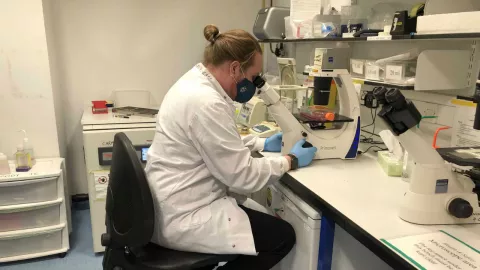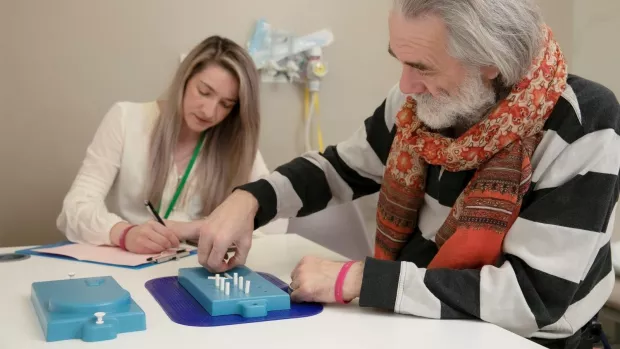
Meet the researcher starting out on his MS research journey in a pandemic
Alistair Gamble is just weeks into an MS Society-funded PhD exploring ways to reduce the risk of PML, a rare but serious disease associated with some MS treatments. He tells us why he’s chosen to follow this path, and what he hopes to achieve for people with MS.
Hi! I’m Alistair, a PhD student at The University of Glasgow. My official title is Chernajovsky Foundation Scholar, because my research is generously funded by The Lorna & Yuti Chernajovsky Biomedical Research Foundation.
A little bit about me
I initially thought I wanted to study maths at university, but after doing one year of it, I discovered how wrong I was. After this, I very quickly swapped degrees to my true calling – biology!
During my undergraduate degree in biology and neuroscience, I learnt a lot about conditions affecting the brain and spinal cord, such as MS and Alzheimer’s disease.
While learning about these conditions, including the medicines available and the latest research, I began to see myself becoming an active researcher in the future. I wanted to help people by decreasing the burden these conditions can have on their lives – possibly helping to find cures as well!
Starting my research journey
I’ve just completed a master’s degree at The University of Edinburgh - specifically researching new treatments for MS. During this degree, I came to see the fast pace and high quality of recent research in MS, and I wanted to be a part of it!
I’m now part of a lab in Glasgow, working with leading experts in neuroscience, immunology and virology. This includes my supervisor, Dr Marieke Pingen. I am beyond lucky to be working with experts in their fields, and the combined knowledge these people have about MS is genuinely awe-inspiring. It is also a massive motivating factor for me to aspire towards becoming like them one day!
The search for new drugs for PML
As a PhD student, I will be trying to discover new ways to treat a disease called PML (or progressive multifocal leukoencephalopathy) which is associated with some MS treatments.
Certain MS drugs which are very effective at treating MS work by dampening the immune system. This can allow a virus, called John Cunningham Virus, to infect the brain. This virus can in turn cause PML. PML is a very rare disease – it affects less than 1% of people with MS. But it is also very serious and can often be fatal.
I’ll be looking at ways of protecting the brain from the virus that causes PML. This will mean people with MS can take their life-changing medications without fearing the risk, even an incredibly small one, of this disease.
Progress so far
Recently, my new colleagues made a really positive discovery. They found that some antibodies, an important part of the immune system, can make certain cells in the brain eliminate the virus.
My research is now going to focus on what makes these cells tick. Then I’ll be trying to figure out ways to make them, and by extension the whole brain, protect themselves against the virus.
A global pandemic
There is one thing I’m scared about – starting this new chapter in the middle of a global pandemic! I’m hopeful the pandemic won’t seriously hinder the overall course of my research. But it certainly won’t be easy at the beginning, while I’m trying to learn all the new skills I’ll need and getting to know everyone.
I am extraordinarily proud to be a part of helping stop people with MS from having to live with the risk of PML, and the fear and uncertainty that can bring.
About PML
PML (progressive multifocal leukoencephalopathy) is a rare but very serious side effect of some disease modifying therapies (DMTs). PML often leaves people seriously disabled and up to one in four who get PML can die.
PML is caused by the JC (John Cunningham) virus. If you don’t have the virus, you’re extremely unlikely to get PML. Over half of people with MS have this virus, but the immune system normally stops it causing problems. But DMTs work by dampening down the immune system. So people taking some of the stronger DMTs are at higher risk of infection from the virus.
The risk of PML is extremely small. A blood test will show if you have the JC virus. If you have it, your health care team will tell you what to look out for and do if you notice signs of PML. These signs include clumsiness, weakness on one side and changes in your speech, vision or memory and thinking.
If you and your doctor think your risk of getting PML on the DMT you’re on is too high, they can change you over to a different drug that doesn’t have this risk of PML.
If you’re being treated with the DMT with the highest risk of PML natalizumab (Tysabri), a longer gap between doses lowers the risk a lot. Of the DMTs currently available PML has only been seen with four of them. It’s most common (but still rare) with natalizumab (Tysabri), and much less common with fingolimod (Gilenya), and very rare with dimethyl fumarate (Tecfidera). There’s so far been one case of PML where ocrelizumab (Ocrevus) was definitely the cause.
If you’re worried about PML, our MS Helpline nurses are here for you to chat things through: 0808 800 8000 or [email protected]



